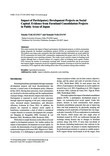This study examines the impact of Japan’s participatory development projects, in which communities design proposals for farmland consolidation projects (FCPs), on community-level social capital. The analysis uses large-scale community data that include detailed information on social capital for 29,179 communities (of which 8,067 communities implemented the project and 21,112 did not). We provide propensity score matching estimates. The results reveal a positive impact on bonding social capital, although there is limited evidence of a negative effect on bridging social capital. Further, FCPs increase the number of community meetings held. Treated communities opt for governance that requires higher cooperative levels for irrigation management. Focusing on social ties outside the community, FCPs negatively affect holding direct sales of rice products among urban residents.

